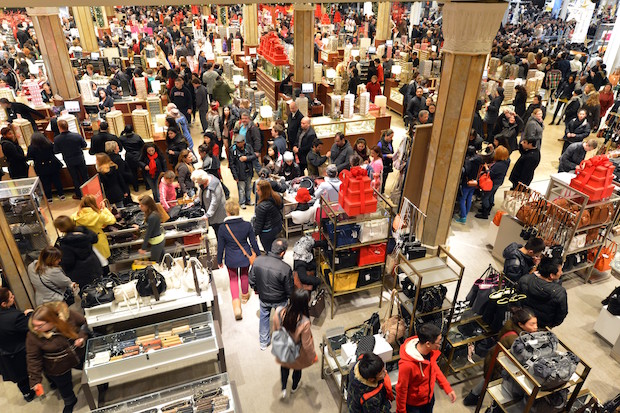Shoppers are predicted to go on a £1.97 billion spending spree today, setting a new record for Black Friday.
Analysts expect record sales, not least because the fall in the value of the pound is forecast to push up the prices of imported goods next year.
In a new move, retailers are now expanding Black Friday over the weekend and into Cyber Monday – an online-only event. The BBC reports that ‘the total for the next four days is forecast to rise to more than £4 billion once the weekend and Cyber Monday are included’.
By Thursday, the discount retailing site TopCashback reported a 30 per cent increase in spending compared to last year. And according to the online retailing association IMRG, more than half the spend on Black Friday will be done online. Claire Davenport, of VoucherCodes.co.uk, said that shoppers were expected to spend £2.31 million a minute this year. Clothing will be the most popular item, followed by TVs and beauty products, according to TopCashback.co.uk. It said that shoppers expect a discount of 35 per cent on average and that nearly half of consumers had been waiting until today to buy a big ticket item such as a TV or washing machine. Nationwide building society said that credit and debit card customers have hiked Black Friday spending so far today. Between midnight and 8:30am, Nationwide customers spent £16.3 million – around £32,000 a minute – which is up on 2015’s figures. Meanwhile, more than 500,000 people visited Argos’s website in the first hour of Black Friday, new chief executive John Rogers told the Today programme. However, The Times reports that ‘huge discounts online and on the high street today will later lead to a mountain of waste being sent to landfill as bargain hunters buy millions of goods they will never use’. Research by the online classified ads website Gumtree suggests that one in ten of the items bought between today and Monday will end up as waste and be incinerated or buried. Housing House prices in the capital are now 14.2 times the average salary, The Telegraph reports. This is more than double the UK’s average ratio. Hometrack says this is far in excess of the growth of salaries. Cambridge, Oxford and Bristol also have house price to earnings ratios that are far higher than the national average. Equities The Times reports that ‘British shares look more overvalued and more vulnerable to a crash than equities in most other major global markets by one measure’. According to the European Central Bank’s twice-yearly analysis of factors that could lead to financial instability: ‘Valuation measures…are in some regions hovering at levels which, in the past, have been harbingers of impending large corrections.’ IncomesThe outlook for wages is ‘dreadful’ with the squeeze on pay lasting for more than a decade, the Institute for Fiscal Studies has said. It added that workers would earn less in real wages in 2021 than they did in 2008.
Paul Johnson, the think tank’s director, said: ‘One cannot stress how extraordinary and dreadful that is, more than a decade without real earnings growth. We have certainly not seen a period remotely like it in the last 70 years and quite possibly the last 100.’
Meanwhile, The Guardian reports that ‘the gap between the rich and poor remains at record levels, according to the Organisation for Economic Cooperation and Development, as the poorest 10 per cent have been unable to recover from the blow dealt by the financial crisis’.






Comments